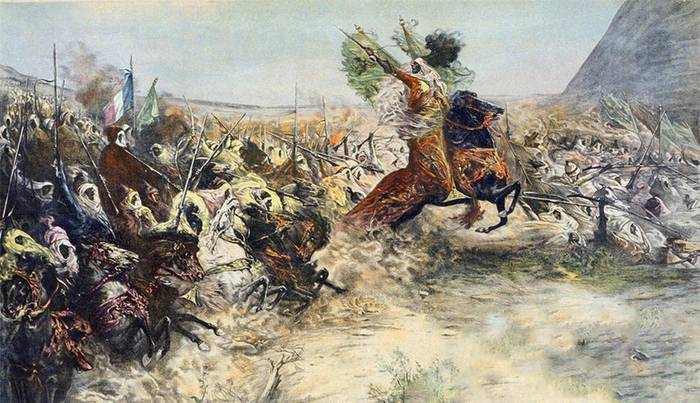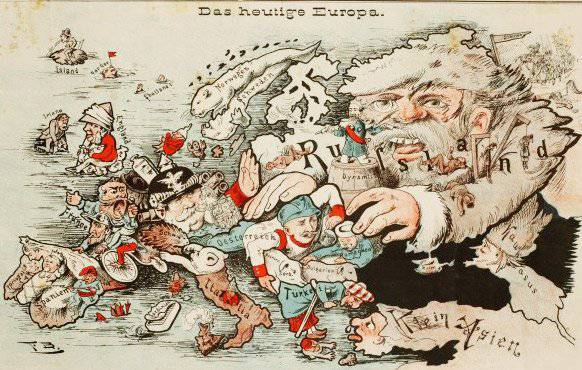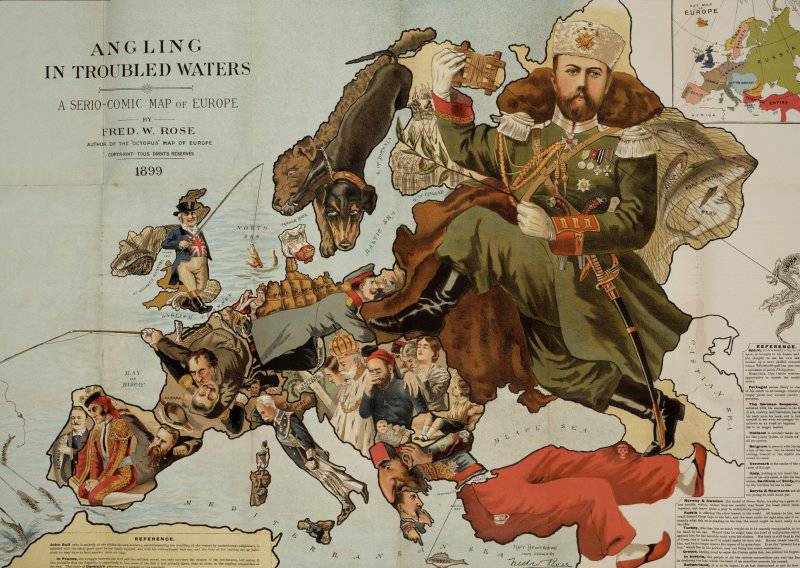One hundred years of disagreement

Echoes of the First World War (WWI) are still heard in different parts of the world. The PRC formally ended in 1918, but the seeds sown for disagreements and violence in the Middle East have no end in sight. Two thirds of a century this region is the main hot spot of the planet. The boundaries drawn by the victorious powers in 1919, at Versailles, led to such strife and feuds that the rest of the planet, despite all its efforts, cannot calm and resolve to this day.
Despite the fact that since the beginning of the PRC has passed a hundred years, the people of the Middle East themselves still do not agree with its political heritage in the form of arbitrarily drawn borders by the victors. It is not by chance that many historians are like a professor. stories and the international relations of Boston University, David Fromkin called the Treaty of Versailles, concluded in 1919, "the world to eradicate all forms of the world."
A simple analysis leads to an amazing conclusion: from the countries of the region, only Egypt and Iran have a more or less long history of stability. Two more countries remain on the basis laid by their founders: Turkey Mustafa Kemal Ataturk and Saudi Arabia, finally united by Abdul-Aziz ibn-Saud in 1932 year. These four states form a circle in which the burning core of the Middle East is located. Here the boiler boils up, consisting of five countries and one country half: Syria, Jordan, Lebanon, Israel, Iraq and Palestine. These states were formed after WWI in London and Paris, therefore D. Fromkin calls them “children of England and France”.
In the center of this infernal circle is the hottest place of the Earth, which for a century was like nowhere in many wars, external and internal (civil), coups, terrorist acts and other political cataclysms. Especially hot here, both literally and figuratively, in the second half of this century. The reasons for turning the region into the hottest point of the planet is enough. They include chronic backwardness, weakness of the Arab elites, frequent intervention of great powers, the role of political Islam, the discovery of oil, the creation of Israel, and, of course, the cold war.
Line in the sand

Yet the main culprits of what has been going on in the Middle East for almost a hundred years are London and Paris, which redrawed the region at will and traced, according to the British historian James Barr, the “line in the sand”.
The main consequence of the WWI, at least for the Middle East, was, of course, the collapse of the Ottoman Empire. It is difficult to say how long this colossus on clay feet would have existed if in November 1914 of the year he entered the war not on the side of Germany and Austria-Hungary, but on the side of the Entente. Surely it would be longer than the 1918 of the year, although sooner or later, the collapse would still have occurred. After all, it was not by chance that Porto, six decades earlier, Tsar Nicholas I called “the sick man of Europe”. Turkey’s illness reached a climax just before the war. Istanbul once controlled the entire southern and eastern shores of the Mediterranean and most of the Balkans. The Janissaries terrified Europe and even besieged Vienna. However, in the first half of the 19 century, France took away the Glorious Ports of Tunis with Algeria, and England - Egypt. In 1911-12, the Italians completed the partition of the African provinces of the Ottoman Empire with the capture of Libya.
Despite the backwardness and poverty of the Port was a tidbit. The participants of the First World War, especially in London, knew that its Asian possessions had innumerable oil reserves.
The results of the war turned out bad for Istanbul. Along with Austria-Hungary, Turkey suffered the greatest territorial losses. It became one of the four empires that ceased to exist as a result of the WWI, and the only one actually divided between the winners: England and France, which threw a few crumbs to small countries such as Italy, Greece and Armenia.
As a result of the Treaty of Sevres, a kind of Versailles Treaty for the Middle East, the Ottoman Empire ordered to live long. The treaty, signed in Sevres on August 10 1920, summed up the results of World War I in the Middle East. Turkey lost the Arabian Peninsula, Syria, Lebanon, Transjordan and Mesopotamia, Armenia1. In addition to the Asian possessions, the Turks were forced to abandon most of the European territories.
Most of all possessions, mandated territories, etc. England received - almost a million (915 thousand) square. kilometers, France (160 thou. sq. km) and Armenia (95 thou. sq. km.). The most valuable, of course, were the British possessions, which included modern Iraq, rich in black gold.
Finally, the borders of post-war Turkey were defined in the 1923 year by the Treaty of Lausanne. On October 29 of the same year, Mustafa Atatürk proclaimed the Republic of Turkey and became its first president.
The basis of all the trouble
The Sevres agreement was based on the Sykes-Picot agreement, named after the diplomats who developed it in May 1916: Frenchman Francois Georges-Picot and the Englishman, Sir Mark Sykes. In addition to England and France, Russia participated in it and Italy later joined.
The agreement defined the scope of interests, i.e. in fact, the territorial claims of England, France and Russia that participated in it and became the de facto partition of the Ottoman Empire. It was this that laid the foundation for many troubles that the people of the Middle East cannot understand yet.
Sykes and Picaud absolutely did not pay attention to the will and desires of the peoples who lived in the territories they shared, and ignored ethnic and religious boundaries. Under this agreement, London claimed the Turkish territories, in which Palestine, Jordan and Iraq are now located. The interests of Paris included the eastern part of Turkey, Syria and Lebanon. Russia went to the northeast of Turkey.
Sykes-Picot agreement was secret. It became public only after the February revolution in Russia, in 1917.
Another very important for the Middle East was the Balfour agreement. British Foreign Secretary Lord Arthur James Balfour promised 2 on November 1917 of the Zionist Federation of Great Britain to allocate Palestine for Jews.
An important reason that made London suddenly have a crush on the oppressed Jews was the accusations of England of imperialism, which sounded louder with each year of the war. Moreover, one of the most energetic prosecutors was Woodrow Wilson, at the end of 1917, re-elected for a second term as President of the United States.
Missed chance
Of course, history does not tolerate the subjunctive mood, but everything could be different. The American president, who arrived in Europe at the beginning of 1919, was extremely surprised. Yesterday’s allies, British Prime Minister David Lloyd George and French President Georges Clemenceau, argued hoarsely for any reason. Naturally, especially a lot of controversy caused the division of production. In particular, in the Middle East, which many considered to be the desert forgotten by God, but which was rich in black gold.
Paris wanted a mandate for Syria and Lebanon. London, under the Sykes-Picot agreement, was to go to Palestine and Mesopotamia, but Lloyd George, because a million British soldiers who had lost 125 thousand dead and wounded had fought in the Middle East, did not want to give the French, who, as they say, have a finger not hit, the bloodshed by the English sands. In addition, the French mandate contradicted the promises of independence, which the British emissaries made to the Arabs, raising them to revolt against the Ottoman Empire.
Innocent Wilson offered a simple, from the American point of view, solution: to ask the people of Syria and Lebanon, and at the same time other territories liberated from Turkish rule, what they want.
For two months, Chicago businessman Charles Crane and theologian Henry King traveled to the Middle East and interviewed hundreds of tribal elders and elected officials. As you might guess, the population of Syria did not want their country to become the mandate of France, and Palestine - of England. London managed to prevent Crane and King from traveling to Mesopotamia with the same mission.
In August, Crane and King submitted their report. They recommended the creation of a single mandate, including the united Syria with Palestine, and transferring it to neutral America, and not to European colonial powers. The head of the new Arab state was to become the son of Hussein ibn Ali al-Hashimi, the first king of Hijaz (part of Saudi Arabia) - Faisal, the last king of Syria and the first king of Iraq.
Alas, to implement this idea, which probably would have changed the whole course of the history of the Middle East failed. Under strong pressure from England and France, and in view of Woodrow Wilson's illness, in September 19 of the year, Crane and King's report was archived. The public learned about it only after three years. By that time, London and Paris nevertheless agreed on a new map of the Middle East, diametrically opposed to what Crane and King had proposed. Syria and Lebanon retreated to France, while Palestine and Mesopotamia, with its oil-rich province of Mosul, later became Iraq to Great Britain. Between the French and English possessions a neutral territory was created - Transjordan 1.
Another interesting episode, which suggests that instead of four Arab states (with the exception of Iraq), it could well be and, probably, one should have been created. When the question arose about the northern border of Palestine and later, naturally, of Israel, one of the advisers wrote to Lloyd George that "there should be no borders between Aleppo and Mecca at all", and therefore such borders, if they are necessary, should be drawn from purely practical considerations. What was done.
East - a delicate matter
Of course, the Arab Middle East was not the only place where, after WWI, the borders were very thoroughly redrawn. The same thing happened in Europe. However, there are at least three big differences between Europe and the Middle East, which in the long run have led to such dire consequences.
First, while the European peoples started to look for national identity at the beginning of the 19 century at the latest, only World War I forced the Arabs to wake up from a long hibernation. At the beginning of the 20 century, they did not even have a political and economic elite. All this, of course, hampered the political development of the region.
Secondly, in view of the lack of seriousness with which after the war the borders in the Middle East were being drawn, there is a strong sense of the existence of secret collusion. Even today, for example, there is a legend, according to which one of the mysterious plots in the border between Jordan and Saudi Arabia is the result of someone accidentally drawing a border on a map with someone ... inadvertently pushed British Colonial Secretary for Winston Churchill 1 with his elbow. As far as this anecdote is true, history is silent, but Sykes with Pico and Lloyd George and Clemenceau have drawn the same lines.
And thirdly, the tension accumulated after WWI and unfair agreements on the redistribution of the world both in Europe and in the Middle East, in the first received a way out at the expense of the Second World War. The Middle East in 1939-45 was not the theater of serious hostilities.
The current situation in the Middle East with its endless conflict was the result of World War I, exacerbated by the consequences of World War II, as well as the creation of Israel, the Cold War and the struggle for the wealth of the Persian Gulf.

Information